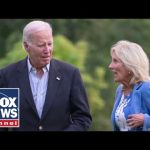In an electrifying turn of events, President Trump has struck major trade deals that are shaking up the world market. For the first time ever, both the Philippines and Indonesia have agreed to open their countries to trade with the United States, marking a noteworthy shift in international economic relations. This announcement came as part of a series of deals designed to enhance American trade, which the President claims will lead to America raking in hundreds of billions of dollars, something the country hasn’t seen before.
Trump’s dealings are not merely about shaking hands and exchanging pleasantries. They signify a grand strategy to reshape trade dynamics, ensuring that America plays a dominant role on the global stage. As the President gets down to business, all eyes are on Japan, Canada, Mexico, and China, with discussions expected to kick off soon as well. Instead of being at the mercy of other nations, American interests are becoming a priority once more, and that’s a game-changer.
For everyday Americans, this restructured trade landscape promises more than just economic jargon. Workers in industries like automotive manufacturing could see their products selling in markets like Japan for the very first time. Moreover, this isn’t just about toys and gadgets; it’s about investing in American jobs. With $550 billion promised from Japan, the potential for new businesses and job creation is enormous. Add to that the prospect of increased agricultural exports, particularly rice, and it looks like farmers will also have a reason to celebrate.
Those skeptical about the trade deals can relax a bit as revenue from tariffs is expected to help balance the federal budget. With over $100 billion on the horizon, this influx will be crucial for maintaining economic stability. Indonesia’s involvement, although not as large as Japan’s, still sets a significant tone for smaller countries in Asia. The new deals signal that America is serious about enforcing fair trade and encourage other countries to step up or risk being boxed out of a lucrative market.
As trade discussions unfold with the European Union, it’s clear that the tide has shifted. The prevailing idea that other nations hold all the cards is outdated. The U.S. is now the market everyone wants to be a part of, making it essential for other countries to play by American rules. With the looming potential of investment from the EU, including a cool $30 billion, it’s time to kick the threats to the curb and focus on finding mutually beneficial trade agreements. The financial markets are starting to understand this dynamic shift and are responding positively, reflecting a sense of certainty that has been elusive for far too long.
This new era of trade and economic strategy promises not just a boost in revenue, but it could pave the way for an uncompromising American economic future. As Wall Street cheers and Japan smiles at their forthcoming agreement, it becomes increasingly clear: the art of the deal is alive and well, and the stakes have never been higher for the American worker. So, buckle up, because it looks like the U.S. is just getting started in reconnecting with the global economy in a big way!




